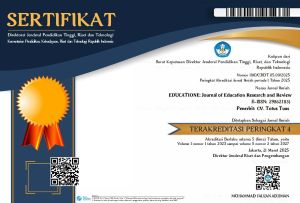DO PRINCIPALS’ LEADERSHIP STYLES MATTER? LINKS TO TEACHERS’ WORK MOTIVATION UNDER JOB STRESS
DOI:
https://doi.org/10.59397/edu.v3i2.126Keywords:
Instructional Leadership, Job Demands–Resources, Motivation, Principal Practices, Teacher StressAbstract
Principal leadership is the second-strongest in-school influence on learning after classroom teaching and shapes teachers’ resources, stress, and motivation; in Indonesia’s island contexts these leadership routines are pivotal. To estimate the associations of principal leadership practices and teacher work stress with teachers’ work motivation in SD Gugus 3, Kecamatan Nusaniwe (Ambon). Quantitative, cross-sectional survey of n = 87 teachers, proportionate stratified sampling; validated scales for learning-centered leadership, teacher stress, and work motivation (Likert 0–4); assumption checks (P–P plot, VIF); Pearson correlations and multiple regression with α = .05. The model was significant (R² = 0.241; F(2,84) ≈ 13.34, p < .001). Leadership showed a positive, significant effect on motivation (b = 0.287, p < .05), while stress had a near-zero, non-significant partial effect (b = 0.005). Diagnostics indicated no harmful multicollinearity and approximately normal, homoscedastic residuals. Learning-centered leadership—clear academic goals, observation-feedback, and principals’ participation in teacher learning—is the most actionable lever to strengthen teacher motivation; stress likely operates indirectly via job demands/resources. Provides practice-ready guidance for island schools: expand teachers’ job resources (autonomy, collaboration, feedback) and streamline demands (paperwork, behavior routines) through principal routines. Employ longitudinal or quasi-experimental designs, incorporate multi-source measures (e.g., observation-based leadership, objective workload), test JD-R mediation and motivation moderation, and link teacher motivation changes to student outcomes.
Downloads
Published
How to Cite
Issue
Section
Citation Check
License
Copyright (c) 2025 EDUCATIONE

This work is licensed under a Creative Commons Attribution 4.0 International License.



















